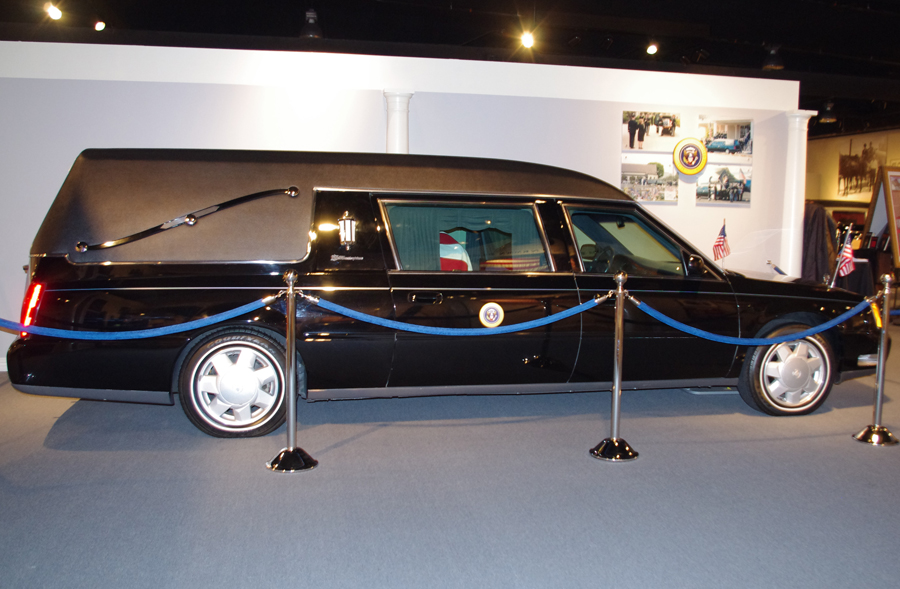
It may sound a bit odd to hear the word vibrant used to describe a museum dedicated to the display of funeral artifacts. However, once you’ve visited this hidden treasure that is tucked away in a largely residential neighborhood about 20 minutes north of downtown Houston, you’ll understand that perhaps your impression of the business of death is not quite accurate. (Story continues below the slideshow.)
INSIDE THE NATIONAL MUSEUM OF FUNERAL HISTORY
The stories told by the various museum exhibits are not at all morbid or dark. Instead, they reflect what was happening in society during the time period represented. While the museum does explore some of the nuts and bolts behind preparing the dead for burial, it also shows us how society celebrates the lives and deaths of those who came before us.
From politics to religion to pop culture, the NMFH has it all: The stunning hearse that transported both Presidents Reagan and Ford to their final resting places, rarely seen Papal artifacts, and a wide variety of unique and sometimes whimsical caskets. The National Museum of Funeral History gives visitors a real sense that the funeral customs and traditions we see used today are ever evolving.
The story of the funeral museum begins with Robert L. Waltrip, a well-known figure in the funeral industry. The Waltrip family is best known for transforming a single funeral home located in Houston’s Heights community into the conglomerate Service Corporation International (SCI). Along the way, Mr. Waltrip dreamed of creating an institution that would preserve the history of the funeral industry and at the same time, educate the public on the importance of the industry in our culture.
In 1992, Waltrip made this happen with the opening of the museum. Today the NMFH covers some 35,000 square feet of exhibit space and welcomes more than 1,500 visitors each month. New exhibits that reflect our changing funeral needs and customs are in the works as are updates to displays that both honor our dead and help us think about our own funeral needs. Seasonal events are added throughout the year such as the current Halloween-themed Dracula exhibit that is now in the rotation.
Throughout the museum visitors will discover interesting trivia such as
the origin of the terms “dead ringer,” “saved by the bell,”
“boneyard,” and “graveyard shift.”
The permanent displays offer casual visitors the chance to peek behind the curtain of the funeral home and at the same time learn more about how we have tended to our dead over the years. For funeral industry professionals, the history of this unique and often misunderstood profession is celebrated and preserved. Regardless of your point of view, there is something to be learned by everyone. Children are invited to participate in entertaining scavenger hunts while adults can feed their appetite for history or just plain curiosity.
- The Presidential Funerals Exhibit: Among the most impressive displays the museum offers is Presidential Funerals. Tastefully displayed are unique memorabilia such as the invoice for George Washington’s funeral and the original eternal flame from President Kennedy’s gravesite at Arlington National Cemetery. Also on display is ammunition from the 21 gun salute held at President’s Ford’s burial service and a replica of the gun that was used in the Lincoln assassination.
- The Papal Exhibit: The NMFS permanent papal exhibit opened in 2008. It is the result of collaboration between the Vatican and the museum. Included are a breathtaking array of artifacts including a life-size replica of St. Peter’s Basilica, papal vestments, and authentic Swiss Guard uniforms. The museum will soon be updating the exhibit to celebrate the canonization of Saint John Paul II and Saint John XXIII.
- Hearses: At first glance, the array of hearses can be a bit overwhelming. The collection ranges from intricately hand-carved wooden adorned vehicles to 18th-century glass faced horse-drawn carriages to modern vehicles such as the Mercedes hearse that transported Grace Kelly’s remains. When taken in total, the collection of hearses offers a glimpse not only into the history of funeral transportation but a look at the evolution of the automobile.
- Coffins & Caskets: The coffin and casket collection (yes, you’ll learn about the difference between the two) offers everything from a whimsical and colorful look at caskets as art to designs in glass and even money. The stories behind the displays can be touching. For example, the unique casket made to hold a family of three which was commissioned upon the death of a couple’s only child.
- The International Hall: The area of the museum which highlights funeral customs from around the world features an ornate Japanese hearse, an exhibit dedicated to celebrating Mexico’s Day of the Dead, and the unique hand carved fantasy coffins of Ghana.
- Thanks for the Memories: With a remarkable collection of original programs and celebrity funeral memorabilia, Thanks for the Memories is sure to bring back recollections of those who have touched us through television, film, politics, and sports. From its tribute to our space pioneers to the original marble slab used at Marilyn’s tomb, visitors are given a chance to reflect on how we have said goodbye to the famous.
- History of Embalming: For those who are interested in the more technical side of the business, the History of Embalming exhibit fills the bill. You’ll start with the techniques established in ancient Egypt and move through to more modern times. A nod is given to Dr. Thomas Holmes, the father of modern embalming, with a recreation of his Civil War work station. Tools and implements used in 1900s embalming are also presented in the context of an embalmers workroom.
- The Tomb of the Unknown Soldier: In tribute to veterans, the museum displays historical information relating to Arlington National Cemetery’s Tomb of the Unknown Soldier. In addition to an authentic uniform worn by the guards responsible for attending the tomb, documents relating to the selection of servicemen to be interred in the tomb and the traditions surrounding the site can be viewed.
As you view the exhibits and think about how society takes care of its dead, it is a good time to pause to think about your own funeral planning and how you would like to have your life celebrated. According to the museum’s President, Genevieve Keeney, the vision for the museum “is to be that neutral environment where people can come and gain a true perspective and understanding of how we celebrate the life of somebody through a ceremony we call a funeral.” At the same time, the museum puts into perspective what we need to think about for ourselves and our families. As Ms. Keeney put it, “what do I want my funeral to say about me, how do I want the people that I leave behind to celebrate my life that I lived and pay tribute to the impact that I had on them and their life?”
For more information on funeral planning, visit Funeralwise.com.
The museum’s motto is “Any day above ground is a good one.” After touring the museum we can also say that any day is a good day to take an hour or two to visit the National Museum of Funeral History.
Got something to add to this story? Please share it in the comments.
The National Museum of Funeral History is located at 415 Barren Springs Drive, Houston, Texas 77090.
The hours are listed are 10am-4pm Monday through Friday, 10am-5pm on Saturday, and 12pm-5pm on Sunday.
General admission is $10 for adults, $9 for seniors and veterans, Children 3-11 are $7. Children 2 and younger are free. Group rates are also available.
To check the hours and admission prices call 281-876-3063 or visit www.nmfh.org.











Jimmie DeRamus
To whom it may concern:
Hello, Please let me introduce myself. My name is Jimmie DeRamus. I have been a collector for many decades now, with diverse interests. Being of Native American descent, the plight of Native Americans, as well as that of international immigrants has been at the forefront of several of my collections. In addition, because of the route of my ancestors across the U.S., I have family and friends in several key areas of the Civil Rights movement from Memphis Tn. to Selma Al. Montgomery Al. and even the Atlanta Ga. area. Due to this many areas of connection, my largest and most significant collections centers around Civil rights, Women’s suffrage, Native American rights, Immigrant plight, etc.
In 2004, My Son Chad became friends with a gentleman who had extremely strong ties to a major historical piece, the Martin Luther King Jr. Hearse, which had been stored and hidden from sight for over 40 years. Chad had a dream to purchase the hearse, restore it, and create a mobile museum capable of going around to schools, libraries, museums, etc. so that the world could enjoy it as much as he and his friend. Unfortunately in 2006, Chad was killed in a family airplane crash, leaving his Dream in my hands. On December 1, 2007 I purchased the car and over the next few years I restored it to its former glory. It became a labor of love and took about 3 years to complete the restoration to as near OEM specifications as possible with the assistance of Mr. Zane Smith, the Superior Coach Dealer for the Memphis area, for approximately 40 years. I then decided to enlarge my collection, now centered on the hearse, to fulfill the dream of a museum type display.
In 2011 I was approached by the History channel and a New York Production Company about doing a Reality Television program highlighting my business, Silver Dollar Pawn and Jewelry Center, family, and my many years of collecting. This turned into one of The History channels top programs “Cajun Pawn Stars”. Unfortunately, due to the show, my plans for the collection had to be put on hold. I opened a display inside my store that featured a small portion of the collection that was displayed alongside Martin Luther King Jr. Hearse. It has been seen by hundreds of thousands since that time with little to no advertising of its existence. This is what brings me to the reason for this email.
I am approaching 64 and trying to slow down a little. I have theorized about opening a museum to display this as well as several of my other rather substantial collections that is probably one of the largest, privately owned, in existence. After much soul searching, I have come to the conclusion that Alexandria, La. Is not the best place for this collection any longer. It needs to be in a location were the people of the world can enjoy and appreciate my years of gathering these items and the sheer volume of the artifacts I have amassed. I have decided, to that end, to sell the American Rights collection, to a collector, an organization or institution that can display it with the honor and integrity that it deserves or partner with a museum to make it available to the public.
Below find a list of some of the other significant items included in the collection. Note: this is only a small sampling of the collection as a whole and we are cataloging more items so that a more complete list can be provided if requested to a qualified buyer, interested in purchasing. I would truly rather sell the collection as a whole or partner with a museum or institution to make the whole of the collection available to the public.
1] Martin Luther King’s HEARSE. 1966 Superior Royale Cadillac Hearse. (Totally Restored with all
provenance) Used By R.S. Lewis and Sons Funeral Home in Memphis Tennessee, for the transportation
of Dr. Kings Body and the procession to the Memphis Airport on April 4th and 5th 1968. It has been
featured in many Publications and Documentaries. Stored in a Memphis warehouse, Hidden from the
public for over 40 years. Personally See Face book:
Lost Hearse -of Dr. Martin Luther King, Jr. (www.facebook.com/losthearsedrmartinlutherkingjr/ )
2) Rosa Parks 1980 Non Violence, Peace Award
3} Montgomery In house Handcuffs, used when Rosa Parks was arrested.
4} 1949 Humanitarian award presented to Walter White
5} A Lorraine Hotel Lobby Chair and Reading lamp used by a member of MLK’s entourage, during the
Assassination.
6} Lorraine Hotel Coat rack used by MLK during his stay April 4th and 5th 1968
7} 2 MLK signed checks from the Montgomery Improvement Assn. {Multiple Notable Sigs in addition to MLK
on each Check}.
8}The set of Bullet lights removed from the 1966 Superior Cadillac Ambulance that transported
MLK from the Lorraine Motel to John Gaston Hospital.
9} the motor and transmission removed from the 1966 Superior Ambulance after it was totaled
in a wreck in Memphis.
10}Rev. Ralph Abernathy signed correspondence, Books, Photographs.
11} 32MM Reel to Reel of Rev. Abernathy’s first speech as leader of the SCLC.
12} Original Photographs never published.
13} Solid Brass WOOLWORTH LUNCH counters placards
14} many personally owned and signed pieces from Rosa Parks
15} Many pieces signed Coretta and many other Notable Civil Rights participants.
In all, well over a 3000 individual historical, unique, irreplaceable, last of their kind and one of a kind piece, just in this American Rights collection.
If interested please contact me via email at jimmie@silverdollar-alexandria.com and I can answer any questions you may have or schedule a phone conversation. Thank you in advance for your consideration and should you, your organization, or anyone you know be interest, I look forward to hearing from you.
Sincerely,
Jimmie DeRamus